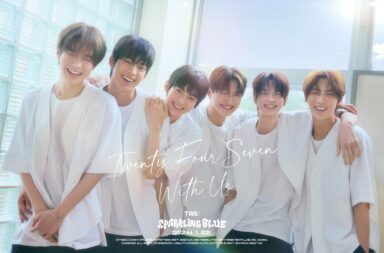 Not too long ago, After School‘s Lizzy and A Pink’s Eunji — two of my favorite girls in K-pop for entirely different reasons — have received a bit of bemused attention for their little “feud” over the title of “satoori-dol,” or satoori idol. Calling on the two’s tendency to speak in their natural, countryside dialect, the title has become a term of endearment fans use in reference to either one of the two. Originally, Lizzy was the first one to receive inquiry for her use of her dialect. The combination of her outgoing personality and her rural way of talking created a “cute Busan girl” character for her to use in variety. Recently however, A Pink’s Eunji has also been receiving more attention for her dialect through her participation on hit drama Answer Me 1997 where she was required to use her natural dialect in portraying her Busan-native character. Lizzy feigned jealousy of the attention Eunji’s receiving, with the supposed “issue” reaching its climax when the two met up and competed in the recent Chuseok special and idol gathering Miss and Mister Idol Korea.
Not too long ago, After School‘s Lizzy and A Pink’s Eunji — two of my favorite girls in K-pop for entirely different reasons — have received a bit of bemused attention for their little “feud” over the title of “satoori-dol,” or satoori idol. Calling on the two’s tendency to speak in their natural, countryside dialect, the title has become a term of endearment fans use in reference to either one of the two. Originally, Lizzy was the first one to receive inquiry for her use of her dialect. The combination of her outgoing personality and her rural way of talking created a “cute Busan girl” character for her to use in variety. Recently however, A Pink’s Eunji has also been receiving more attention for her dialect through her participation on hit drama Answer Me 1997 where she was required to use her natural dialect in portraying her Busan-native character. Lizzy feigned jealousy of the attention Eunji’s receiving, with the supposed “issue” reaching its climax when the two met up and competed in the recent Chuseok special and idol gathering Miss and Mister Idol Korea.
As trivial and joking as the issue was, something that got my attention was how important the distinction of being considered the satoori-idol was to Lizzy. While most of the remarks she said were undoubtedly said in jest, Lizzy still spoke of the matter as if she’d actually lose fans once she’d lose that distinction. At face value, her reaction seemed largely exaggerated and frivolous. Which is was. A girl like Lizzy could honestly care less about losing something that insignificant, and I doubt she’d lose a large number of members, if any at all, in her fanbase now that she’s no longer the only well-known satoori-dol. But upon consideration of the nature of K-pop, its system, and its fans, her reaction could actually have some foundation to it, bringing attention to a pretty unfortunate trend in K-pop.
 The matter I’m talking about here is K-pop and its immutable use of labels. By themselves, labels, characters, and little titles used by idols are harmless, even cute or amusing. The unfortunate implications lie, however, in the huge presence the labeling of idols has in the entire idol industry. It is as if it is entirely necessary for idols to be labeled and assigned to a specific, and often times inescapable role, lest they be forgotten or deemed boring. That something as trivial as an idol’s age, their area of origin, or the way they speak needs to be highlighted and exaggerated or else the idol would ultimately be regarded (ironically) as one-dimensional. And as worrying as it is, this implication isn’t entirely baseless, speaking some truth in the nature of the idol business.
The matter I’m talking about here is K-pop and its immutable use of labels. By themselves, labels, characters, and little titles used by idols are harmless, even cute or amusing. The unfortunate implications lie, however, in the huge presence the labeling of idols has in the entire idol industry. It is as if it is entirely necessary for idols to be labeled and assigned to a specific, and often times inescapable role, lest they be forgotten or deemed boring. That something as trivial as an idol’s age, their area of origin, or the way they speak needs to be highlighted and exaggerated or else the idol would ultimately be regarded (ironically) as one-dimensional. And as worrying as it is, this implication isn’t entirely baseless, speaking some truth in the nature of the idol business.
These little titles or labels, whether we think about it or not, appeal to the curiosity of us fans. These little distinctions help us tell apart an idol or group from their countless idol peers. The idol market is getting more and more saturated with more and more groups debuting everyday, many of which share similar traits. As such, these little differentiations, as slight as they are, are particularly helpful for rookie groups since these groups need as much distinctions as possible to stand out and possibly gain fans. Even if they don’t speak of the entire group or their concept as a whole, for them, anything is better than being nameless “nugu” groups.
Simply, as negligible as it may seem, we’re most likely going to check out a group or member with a cute or interesting label to them rather than one without one. If we compare an idol with a product we buy on the store be it food or utilities (the similarities are scarily uncanny, to the point that they may as well be the same thing),  if an group’s name is a product’s title — their company being their brand — then the brief moto or slogan would be their label. It gives a brief and slight synopsis of a trait of the group or idol, warning you of what to expect, and it may even attract your attention, simply out of curiosity about what this group with this particular label is all about.
if an group’s name is a product’s title — their company being their brand — then the brief moto or slogan would be their label. It gives a brief and slight synopsis of a trait of the group or idol, warning you of what to expect, and it may even attract your attention, simply out of curiosity about what this group with this particular label is all about.
Take for example 2PM when they debuted. While surely it was not the only factor contributing to their popularity, their title of being “beast-dols,” and consequently their conceptually-fitting uber-masculinity, definitely caught the attention of many. Compare that with U-Kiss who had a much harder road as idols compared to 2PM despite debuting at the same time and containing some similar traits. A factor in why 2PM was able to gain more prominence than U-Kiss was because 2PM had a major peculiarity right from the start, a specific niche to cater to almost, that U-Kiss lacked. To this day, I still have trouble assigning a specific distinction to U-Kiss that separates them from all the other idol groups despite being their fan. That thought alone can speak how difficult it would be for U-Kiss to escape their seemingly eternal “nugu” status, since they lack a trait to give them a name, a distinction. While there are certainly more reasons why 2PM has become more successful compared to U-Kiss other than their “beast-dol” concept — a bigger and more renowned company, better quality music at the time, and more connections just to list a few — a prominent concept would have definitely helped U-Kiss gain more attention right from the start.
 This same logic can also apply as to why Secret is less renowned compared to fellow foursomes Miss A or Sistar, despite debuting in similar periods (with the former actually debuting the earliest) with similar concepts, and a similar pool of talent. While U-Kiss and Secret slowly but surely managed to grab the attention of a now-steady fanbase, similar groups but with more distinction to them ended up better off, speaking loads about the importance of distinction and these seemingly insignificant titles in K-pop.
This same logic can also apply as to why Secret is less renowned compared to fellow foursomes Miss A or Sistar, despite debuting in similar periods (with the former actually debuting the earliest) with similar concepts, and a similar pool of talent. While U-Kiss and Secret slowly but surely managed to grab the attention of a now-steady fanbase, similar groups but with more distinction to them ended up better off, speaking loads about the importance of distinction and these seemingly insignificant titles in K-pop.
But as (unfortunately) necessary these labels are to K-pop, they sure don’t come with their own set of disadvantages. For one, like I mentioned above, they’re practically inescapable. While their effect is often minimal, the exaggeration of one particular, and oftentimes trivial, trait could get annoying, particularly if the trait in question isn’t that positive in the first place. To illustrate this, let’s look at B1A4 and their “country-dol” distinction, stemming from how all of the boys come from more rural areas of Korea. While that title along with their many others surely caught the attention of their eventual fans, it’s could get potentially annoying how much shows love to show their unfamiliarity with the city.
 Almost all of the variety shows they participated in, from Match Up to Sesame Player to even Hello Baby, decided to throw the boys into streets of Seoul to fend for themselves or even ask trivia questions about the city. While certainly amusing, these antics are often irrelevant to the whole purpose of the show or episode. Furthermore, I feel B1A4 will never really escape this title either. Even if they’ll finally get used to the city, they’ll still be treated like country bumpkins and forced to do these tasks that require them to act lost in the city.
Almost all of the variety shows they participated in, from Match Up to Sesame Player to even Hello Baby, decided to throw the boys into streets of Seoul to fend for themselves or even ask trivia questions about the city. While certainly amusing, these antics are often irrelevant to the whole purpose of the show or episode. Furthermore, I feel B1A4 will never really escape this title either. Even if they’ll finally get used to the city, they’ll still be treated like country bumpkins and forced to do these tasks that require them to act lost in the city.
Also, there’s Narsha‘s distinction as the “adult-dol.” Now don’t get me wrong; I absolutely love Narsha’s character, perverted jokes and all. However, all the jokes about Narsha’s age got tiring really fast, as did all the gags about how she needs to get married right away.
In conclusion, these little labels, be it being a beast-dol, country-dol, or adult-dol, are like little concepts for a group or individual, only they tend to be more permanent and less changeable compared to comeback concepts. They help get attention for the group or individual, but more than that, they give the group or individual distinction, something crucial in the saturated and sadly homogeneous nature of K-pop. When looking at it through that perspective, it’s much easier to understand Lizzy’s faux-worry. By losing her distinction as the sole satoori-dol, it might become a bit harder for her to attract new fans. Her satoori was actually a big part of her character, so having more than one idol with that distinction somewhat makes her less remarkable or noteworthy.
What do you think of these labels, Seoulmates? Do they really help in getting the attention of fans? Are they really that prominent in the Korean entertainment scene? Make sure to share your insight!
(WM Entertainment, Nega Network, KBS, JYP Entertainment, Cube Entertainment, Pledis Entertainment, NH Media, Nate)


